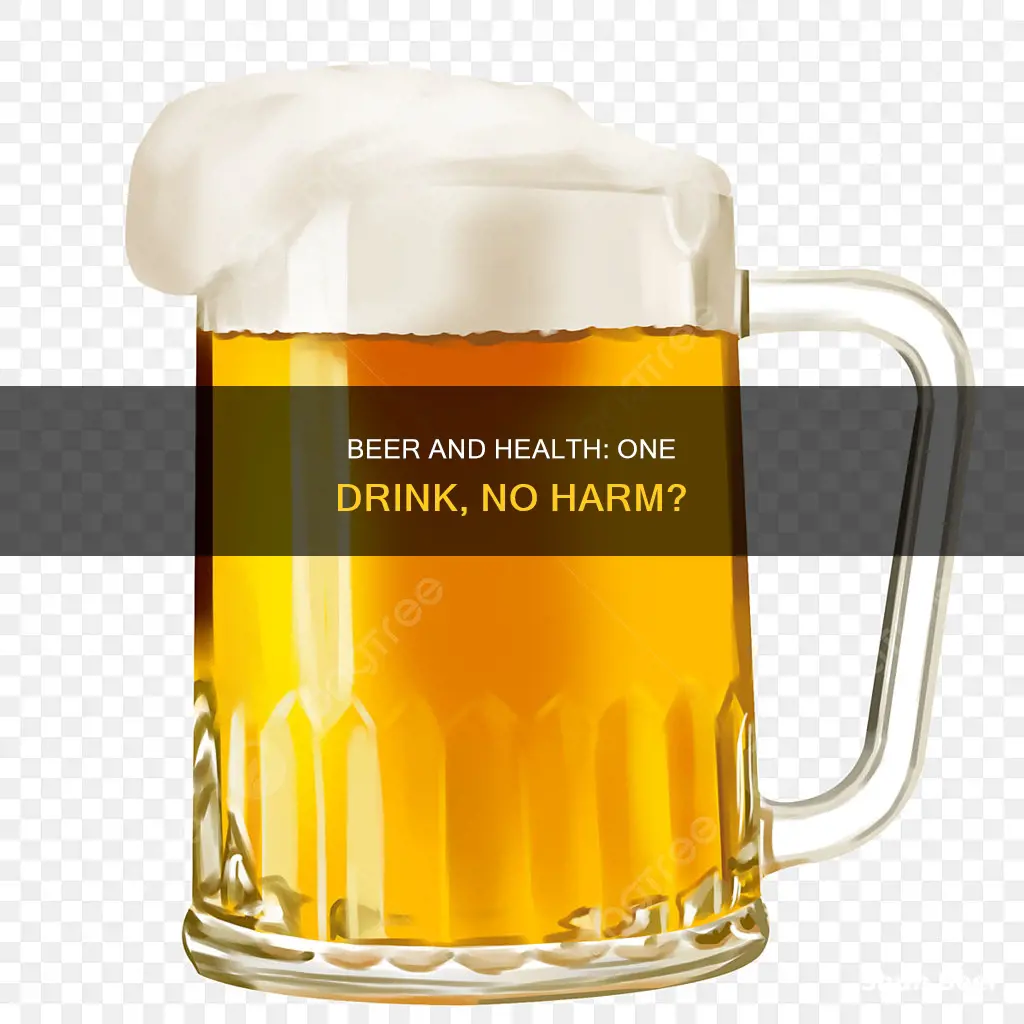
Drinking alcohol is a common way for people to relax and socialise, but is it ever okay to drink just one beer? Alcohol is a drug, and research shows that even one small drink per day can have negative health effects. A recent study found that people who had one or two drinks four or more times a week had a 20% higher risk of premature death. Another study found that drinking just one beer a day is enough to increase blood pressure, which could lead to cardiovascular disease. While some research suggests that moderate drinking may have some health benefits, such as improved heart health and blood sugar control, the risks of drinking alcohol, including depression, weight gain, and liver disease, generally outweigh the potential benefits. So, while having one beer may not seem like a big deal, it's important to be aware of the potential risks associated with alcohol consumption.
| Characteristics | Values |
|---|---|
| Health effects | Positive: improved heart health, better blood sugar control, stronger bones, reduced dementia risk |
| Negative: increased risk of early death, cancer, cardiovascular events, alcohol dependence, depression, liver disease, weight gain | |
| Amount | 12 ounces or 355 mL |
| Calories | 153 |
| Alcohol content | 4-6% |
What You'll Learn

Beer and heart health
Beer is one of the most popular alcoholic beverages worldwide, with a history of consumption that dates back thousands of years. In the United States, a standard beer serving is typically defined as 12 fluid ounces (355 milliliters) and contains around 14 grams of pure alcohol. While moderate beer consumption, defined as one drink per day for women and one to two drinks per day for men, has been linked to potential health benefits, excessive drinking can lead to adverse effects. This article will specifically explore the relationship between beer consumption and heart health.
Potential Benefits of Moderate Beer Consumption on Heart Health
Moderate beer intake, defined as one drink per day for women and one to two drinks per day for men, has been associated with several potential benefits for heart health. Here are some key points:
- Improved Heart Health: Several studies suggest that light to moderate beer and alcohol intake may be linked to a lower risk of heart disease. A 12-week study in 36 overweight adults found that moderate beer intake improved the antioxidant properties of HDL ("good") cholesterol and enhanced the body's ability to remove cholesterol, which may have beneficial effects on heart health.
- Reduced Risk of Cardiovascular Events: Some research indicates that low to moderate beer intake, up to one drink per day for women and up to two drinks per day for men, could lower the risk of cardiovascular events and heart disease to a similar extent as wine consumption.
- Protection Against Cardiovascular Disease: One study found that consuming one or two drinks about four days per week was associated with a reduced risk of cardiovascular disease. However, daily consumption, even when light, eliminated these benefits.
Potential Risks of Excessive Beer Consumption on Heart Health:
Excessive beer consumption, defined as more than moderate intake, can have negative effects on heart health. Here are some key points:
- Increased Risk of Heart Disease and Stroke: While light to moderate alcohol intake may have potential benefits, heavy consumption can increase the risk of heart disease and stroke.
- Higher Mortality Risk: A study by Hartz et al. found that people who consumed one or two drinks four or more times per week had a 20% higher risk of premature death compared to those who drank less frequently. This increased risk was consistent across all age groups.
- Cardiomyopathy: Excessive alcohol intake can lead to cardiomyopathy, a disorder that affects the heart muscle.
- High Blood Pressure: Regular or heavy alcohol consumption can contribute to increased blood pressure.
- Arrhythmias: Binge drinking, defined as consuming multiple drinks in a short period, can cause irregular heart rhythms known as arrhythmias.
In conclusion, while moderate beer consumption, defined as one drink per day for women and one to two drinks per day for men, may have potential benefits for heart health, excessive drinking can lead to adverse effects. It is important to note that the potential benefits of moderate intake should be weighed against the risks associated with excessive consumption. Additionally, individuals should consult with their healthcare providers to determine safe drinking guidelines based on their personal health status and risk factors.
Beer and H. Pylori: What You Need to Know
You may want to see also

Beer and blood pressure
Drinking one beer a day may have some health benefits, such as improved heart health, better blood sugar control, stronger bones, and a reduced risk of dementia. However, it is essential to understand the impact of alcohol on blood pressure, especially if consumed regularly or in larger quantities.
Alcohol can have a significant effect on blood pressure, and drinking too much can lead to high blood pressure, also known as hypertension. When you consume alcohol, it affects the muscles in your blood vessels, causing them to narrow. As a result, the heart has to work harder to pump blood around the body, leading to an increase in blood pressure. This effect is more pronounced with regular drinking and if you are over the age of 35. Even one drink per day can increase the risk of developing hypertension.
The American Heart Association recommends limiting alcohol intake to no more than two drinks per day for men and one drink per day for women. These guidelines are specifically for individuals who choose to consume alcohol. It is important to note that drinking less alcohol is generally recommended for maintaining heart health and managing blood pressure.
While light to moderate alcohol consumption may offer some benefits, heavy drinking and binge drinking have been associated with negative health consequences. These include an increased risk of early death, alcohol dependence, depression, liver disease, weight gain, and various types of cancer. Therefore, it is crucial to monitor your alcohol intake and be aware of the potential impact on your blood pressure and overall health.
In summary, while drinking one beer may not cause significant issues with blood pressure, regular consumption or exceeding the recommended daily limits can lead to adverse effects. It is always advisable to consult with a healthcare professional to understand your specific limits and risks, especially if you have existing health concerns or are taking medications.
Beer Blackout: Understanding Alcohol's Impact on the Body
You may want to see also

Beer and diabetes
People with diabetes do not need to abstain from alcohol, including beer. However, there are some important safety considerations. Firstly, alcohol competes with the liver's ability to produce glucose, which can lead to dangerously low blood sugar, known as hypoglycemia. This can occur up to 24 hours after drinking and is more likely if drinking on an empty stomach. Therefore, drinking in moderation and eating food while consuming alcohol are recommended.
Beer is typically higher in carbohydrates than other alcoholic drinks like wine or spirits, and the carb content varies depending on the type of beer. "Light" beers have the fewest carbs, usually five grams or fewer per serving, and are also lower in alcohol content. Hoppy craft beers like IPAs and stouts tend to be much higher in carbs, with 15 grams or more per serving, and should be limited to one serving.
Moderate alcohol consumption, defined as no more than one drink per day for women and up to two drinks per day for men, is generally considered safe for people with diabetes. "Binge drinking" or consuming more than four drinks (for women) or five drinks (for men) within two hours is strongly discouraged for health and safety reasons.
It is important to note that excessive alcohol intake is associated with an increased risk of type 2 diabetes, as it can reduce the function of organs like the liver and pancreas, leading to worse glucose control. Alcohol can also interfere with diabetes medications, reducing their effectiveness. Therefore, it is recommended to consult a doctor or healthcare provider before consuming alcohol to ensure it will not negatively impact your health or medication regimen.
Brahmins and Beer: Is Alcohol Consumption Allowed?
You may want to see also

Beer and weight gain
Beer is often associated with weight gain, particularly around the belly, which is commonly referred to as a "beer belly". While moderate drinking of one beer per day or less is not linked with significant weight gain or a "beer belly", drinking larger amounts can lead to weight gain over time. This is because beer is high in calories, carbohydrates, and alcohol, but low in other nutrients. A standard 12-ounce (355-millilitre) beer contains around 153 calories, and beers with higher alcohol content tend to have more calories. Therefore, consuming multiple drinks can contribute to weight gain.
There are several ways in which beer may contribute to weight gain:
- Increased calorie intake: Beer contains a significant number of calories, and drinking alcohol can also increase your appetite, leading to excess calorie consumption.
- Inhibition of fat burning: Alcohol is prioritised by the body over other sources of fuel, including stored fat. This means that regular drinking may prevent your body from burning fat.
- Phytoestrogen content: Beer contains phytoestrogens, plant compounds that can mimic the female sex hormone oestrogen. It is suggested that these phytoestrogens may increase the risk of storing belly fat, although the exact effects are unknown.
- Binge drinking: Binge drinking, or consuming large amounts of alcohol over a short period, can increase the risk of belly fat, regardless of the type of alcoholic beverage.
To minimise the risk of weight gain, it is recommended to limit alcohol intake, practice portion control, and lead a healthy and active lifestyle. Additionally, rotating in non-alcoholic or alcohol-free beers can help reduce calorie and carb intake while still enjoying the taste of beer.
Does Scottie Scheffler Enjoy a Beer?
You may want to see also

Beer and cancer
Drinking alcohol, including beer, has been linked to an increased risk of developing several types of cancer. Research has shown that alcohol consumption can lead to a higher risk of head and neck, breast, colorectal, esophageal, liver, stomach, and pancreatic cancers. Even light drinking, defined as one drink per day for women and two drinks per day for men, has been associated with an elevated risk of cancer.
The link between alcohol and cancer is attributed to the way alcohol is metabolized in the body. Alcohol is broken down into acetaldehyde, a toxic chemical and probable human carcinogen. Acetaldehyde can damage DNA, the genetic material that controls cell growth and function. When DNA is damaged, cells can grow out of control and turn cancerous.
The risk of alcohol-related cancers is also influenced by genetic factors, specifically genes that encode enzymes involved in metabolizing alcohol. For example, individuals of East Asian descent who carry a certain variant of the gene for the enzyme alcohol dehydrogenase (ADH) have a higher risk of pancreatic cancer when consuming alcohol.
In addition, smoking and drinking together significantly increase the risk of developing cancer. Tobacco and alcohol together pose a greater health risk than either substance alone.
The amount of alcohol consumed is directly proportional to the risk of developing cancer. Studies have shown that drinking three or more alcoholic drinks per day can increase the risk of stomach and pancreatic cancers. Furthermore, drinking about 3.5 drinks per day can double or triple the risk of mouth, pharynx, larynx, and esophageal cancers, while also increasing the risk of colorectal and breast cancer by 1.5 times.
To reduce the risk of cancer, it is recommended to limit alcohol consumption or abstain from drinking altogether. According to guidelines, moderate alcohol consumption is defined as up to two drinks per day for men and up to one drink per day for women. However, it is important to note that any alcohol consumption, even within these limits, can still elevate the risk of cancer.
Beer Belly Blues: Drinking Habits and Gut Health
You may want to see also
Frequently asked questions
Drinking one beer per day may have some health benefits, such as improved heart health, better blood sugar control, stronger bones, and reduced dementia risk. However, heavy and binge drinking negate these potential benefits and are associated with an increased risk of early death, alcohol dependence, depression, liver disease, weight gain, and cancer.
In the United States, a standard beer is typically defined as 12 ounces or 355 milliliters with an alcohol content of around 5%. However, the alcohol content can vary from 0.5% to 40%.
Even light drinking can increase the risk of death. A study found that people who drank one or two drinks four or more times a week had a 20% higher risk of premature death compared to those who drank less frequently. Additionally, drinking one beer a day can increase blood pressure, potentially raising the risk of cardiovascular disease.
Beer contains B vitamins and minerals like potassium, calcium, thiamine, iron, and zinc due to its production process. However, these nutrients are present in small amounts, and it is better to obtain them from whole foods like fruits and vegetables.
It is important to consider your overall health, age, gender, and any medications you are taking. If you are pregnant, planning to drive, or operating machinery, it is best to avoid alcohol completely. Additionally, if you have a medical condition that could be worsened by alcohol, it is advisable to consult with a healthcare professional before consuming any amount of alcohol.







